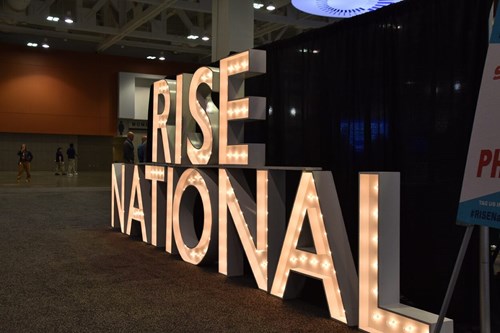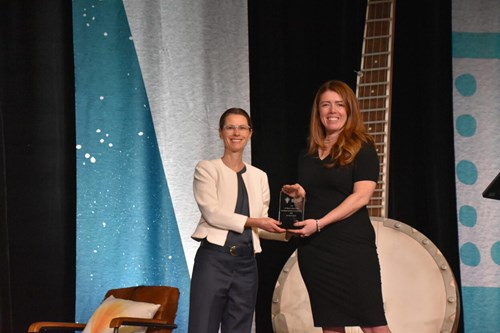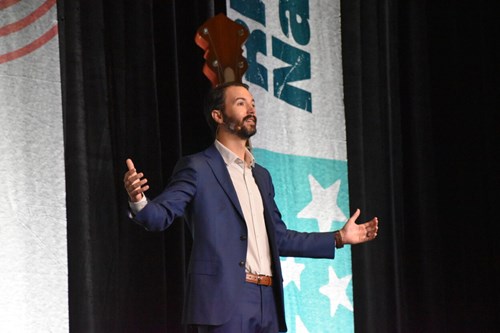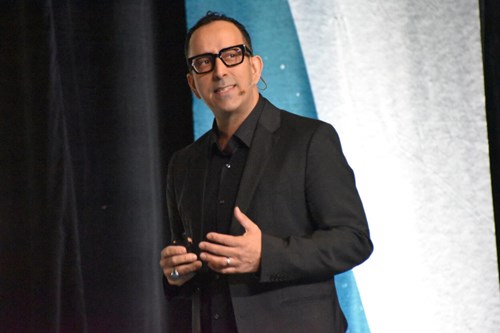It’s been an incredible two days at RISE National with 45 sessions, 150 speakers, three amazing keynotes, and an exhibit hall featuring 175 sponsors. Here are the highlights from this morning’s sessions

We kicked off the last full day of the conference with a round of speed-networking roundtable sessions, followed by the presentation of the prestigious Dr. Martin L Block Award for Innovation & Excellence. The annual award, sponsored this year by Nymbl, is given to an individual who has advanced the lives of America’s seniors through clinical leadership, policy vision, and by superior example of the RISE mission to promote continuous improvement in the health care system.
Our 2024 recipient is Amy Boutwell, M.D., MPP, founder and president of Collaborative Healthcare Strategies.

Dr. Amy Boutwell, left, accepts the Dr. Martin L Block Award for Innovation & Excellence, from Laura Davis, director of strategic accounts, Nymbl Science.
Laura Davis, director of strategic accounts, Nymbl Science, presented the award to Dr. Boutwell, who was chosen for her work and commitment to transform health care delivery, developing models to reduce readmissions, accelerate the development of community hospitals’ ability to transition to value-based payment models, and transform care for multi-visit patients (MVPs) who experience a cycle of recurrent acute care utilization. More than 275 hospital-based cross continuum teams have taken part in the MVP Implementation Coaching Program to date. As an example of the program’s impact, the Harris Health System, the third largest safety net system in the nation, was able to reduce emergency visits for MVPs by 15 percent and lengths of stay by 30 percent.
Dr. Boutwell said she felt privileged to be honored in Dr. Block's legacy. She described her work in the last 15 years as fun, helping health care teams and those who pay for health care improve the care of people with cognitive impairments and mobility issues. "Every single initiative starts with a team," she said, adding that she believes health care transformation occurs from cross-continuum team providers and those who share in their care.
Congratulations to Dr. Boutwell and all our nominees!
Keynote Jeremy Poincenot inspires with his keynote on embracing the power of interdependence
Next, world champion blind golfer Jeremy Poincenot took the stage for his keynote presentation, “Together we are limitless,” sponsored by Inovalon.

Poincenot described his life as a 19-year-old with 20/20 vision who thought independence was key to success. He was living the life he dreamed of as a college sophomore living in the dorms, joining a fraternity, and playing sports. “Everything in my life was trending in the right direction,” he said.
One day as he walked around campus, he noticed he had to squint to read a sign. Home for Thanksgiving, he saw an optometrist who thought he may have a brain tumor. Over the next two months he described going on a “medical mystery tour,” seeing multiple doctors and being misdiagnosed several times. During those two months his vision deteriorated dramatically, and he is now legally blind with no central vision. He was diagnosed with Leber’s Hereditary Optic Neuropathy (LHON), a rare genetic disorder that affects 100 people in the U.S. each year and has no treatment or cure.
Suddenly his life of independence turned into a life of dependence. He could no longer drive, read a menu, distinguish the faces of long-time family and friends, or play golf. “I was devastated,” Poincenot recalled. “I thought, ‘why me’ every day for months.”
His attitude eventually changed, and he gained a new perspective when one of his best friends from college offered to take two easy classes with him, walking with him to class, taking notes for him, and helping him study for exams. “What Josh did for me was monumental,” he said, adding that he eventually graduated with a degree in business. “I remember one day walking around campus, and I told him, 'Josh, I appreciate your help. I know I’m a burden.' He said, ‘you are not a burden, you are a blessing.' I thought, what is he talking about? What could he be getting from this? I thought only I benefited from the relationship.
Poincenot urged attendees to “be a Josh.”
His college roommate offered to start a fundraiser to raise money for LHON and together the two began tandem cycling and starting the ride for CURE or Cycling Under Reduced Eyesight, a 200-mile bike ride from Santa Barbara to San Diego. The fundraiser began in 2009 with four riders and grew to 20-25 riders.
“I consider myself lucky because I’ve talked to others who have lost their sight and a lot say their friends abandoned them…My friends rallied around me and supported me. They helped make me a happier person and in return that makes it easier for them to be around me. When I think of the inception of the CURE ride, it created an opportunity for us to do something together and Mark gave me something to look forward to at a time I had nothing to look forward to,” Poincenot said.
He asked attendees to consider whether they are creating enough opportunities for themselves and others.
Poincenot said another turning point for him was when his mother learned about a blind golf association and tournaments throughout the country and the world. Every blind golfer has a guide to help with each and every shot. Poincenot’s father serves as his guide and together, working interdependently, they have won three world championships and nine national championships.
He told attendees they can harness the power of interdependence by following the “SEE: method: Seek help, embrace help, and Extend help.
“When we move from a me mindset to a we mindset, our lives become richer in unexpected ways,” he said. “If you are more interdependent, you’ll be more successful, and you will handle challenges better and you’ll be stronger. I’m happier today legally blind than I was at 19 and fully sighted. That’s the gift of interdependence.”
Futurist Ian Khan offers insights into how AI and technology will change health care
Ian Khan, a future leadership expert, offered his thoughts on what health care may look like in the next 25 years.

We are currently living in an era where change is progressing much faster than ever before and it is happening in multiple directions. “The technology has the potential to surpass us,” he said.
There is so much hype over artificial intelligence (AI) people are paralyzed when they think about it. But we must increase our ability to understand technology and change to be relevant in 10, 20 and 30 years. “That’s just reality,” Khan said, noting that farming was the main industry prior to the Industrial Revolution and there are not that many farmers today. “This is how progress changes what we do. Thirty years ago, we didn’t have as many data analysts or programmers. In the future, there will be less programmers.”
The danger, he said, is that people can now use the technology to produce deep fakes, which can create more fraud. To control AI and where we are headed, Khan said we need regulations and guardrails.
“What is the future of health care? I don’t’ have answers,” he said. “There are so many different aspects to health care from providers, payers, and patients.”
But there is so much data being collected within health care that there is the potential to utilize it to help people stay healthy before they get sick. AI may spur the rise of precise and predictive medicine to use data to support what patients need. “We have to see technology as a companion to what we do and how we can use it to augment what we do.”
While some jobs may be eliminated due to AI, he encouraged attendees to develop their skills as collaborators, educate themselves and staff, think about how you can use and analyze data, and work with policymakers on regulations and risk.
